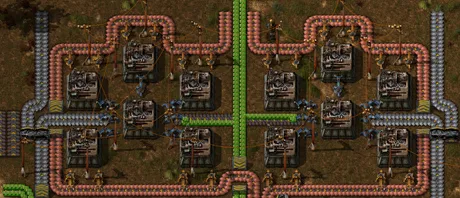
I've never liked Sandbox games.
I guess the ultimate sandbox game is Minecraft, and I just do not understand the appeal. For me personally, it's much more fun when there are defined goals to accomplish rather than just running around doing whatever. Factorio is a sandbox, but at least with this game the goal is to build a rocket and get off the hostile planet. However, even this is a very loose goal that can be reached in a billion different ways.
I haven't played Factorio in a while, mostly because I can get sucked into a blackhole of compulsive addiction and it takes a long time to get out of it. Then once you get something done there are always a thousand other things to do. It's never ending. The first time it happened my witness team joked about my death as I was MIA for an entire month.
The ultimate purpose and theme of Factorio is automation, and thus I will have to start a new game right now just to prove my point:
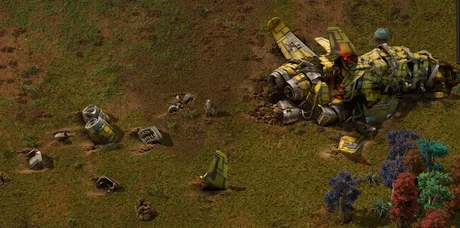
New Game
We begin having crash-landed on a hostile planet. We have nothing but a pick in our hand and access to a 'small' cluster of starting resources, which is plenty to get past the early game but not nearly enough to scale up as necessary once we've been tinkering around for numerous hours. I think it took me like 80 hours to beat the game on my first try, and around 30 the second time around. The learning curve is pretty high on a game like this.
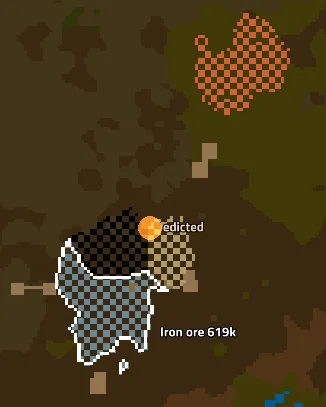
During this opening phase we have to do everything by hand, including creating 10 "red research potions" (automation science packs) in order to create assembly buildings that can create products automatically assuming they have access to the necessary resources.
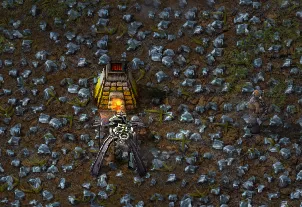
This is the most basic setup for smelting iron ore into usable iron plates. The mining drill (bottom) feeds iron ore directly into a stone furnace, which turns the ore into plates. Both of these buildings require a fuel source, which is normally provided as coal this early in the game (but you can use lumber chopped by hand in a pinch).
This is an extremely manual solution, because both building require a coal power source to operate, which has to be fed by hand this early in the game without any belts or pickers (inserters). Also, if the stone furnace fills up to 100 plates that is the maximum and it will shut down until plates are manually extracted from the building.
Main resource: Iron
Iron is the most important resource in the early game and is used in mass to build most things. Copper is only used for electronic circuits, power distribution, and science packs, but you don't need a lot to start.
However, to even consume the science packs we need one or more "labs" to process them, and both labs and assemblers need electricity to function. The first step toward an automated base is:
- Building an offshore pump and transporting water via pipes.
- Building a boiler and powering it with coal.
- Using the boiler to convert water from the pump into steam.
- Using the steam to convert heat into electricity via turbine.
- Connecting power polls from the turbine to buildings that need it.
And these five steps are considered the easy opening steps of the game just to get electricity to buildings. It's easy to see how complex this simulation becomes when belts, assemblers, and all manner of products need to be created.
Getting ahead of myself.
The point of this post is to show how crypto is much like this opening game of Factorio. At first we are doing everything by hand, but the ultimate goal is automation and decentralized production.
The reason I'm getting ahead of myself is that I feel like I've just started my automated journey when it comes to crypto. Only took four years to get here. Blogging and curation have provided me with both passive and active income, but the true gem of this automated base is materializing in the form of AMM DEFI yield farms (CUB). However, even this is just the sad opening act of exponentially greater things to come.
This is a fun little hack that works very well at the very start of the game. Two mining drills are pointed at each-other creating a semi-automated solution right at the beginning of the game with no belts or pickers.
The mining drill requires coal to function, which it gets fed from the other drill. These drills will not stop mining until their inventory is full (50 coal), so every once and a while I can stop by here and pick up 100 coal for free, which allows me to manually power other buildings at the start of the game.
First Factorio Game
As with any game or skill we make a lot of mistakes when we have no idea what we are doing during the first run through. I feel like this sentiment also heavily applies to the cryptosphere. We are all stumbling through this reality together, but it is still profitable and fun in the process, even if we look like noobs and make a ton of glaring mistakes on the way: this is all part of the learning process.
One of the biggest mistakes I made in my first game was trying to build a base using coal mining drills instead of upgrading to electric as soon as possible. Much like crypto, it took me a long time to realize that automation on a larger scale was definitely the way to go. After a lot of wasted time: I ended up with something that I needed to tear down and start all over. Such is the curse of scaling combined with a lack of forethought & planning.
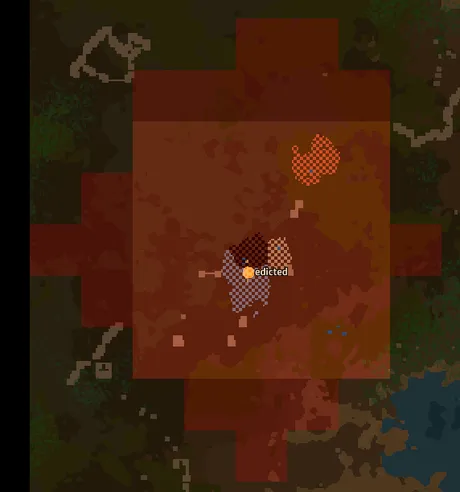
Scaling up is difficult
We are surrounded by thousands of hostile aliens who's purpose in the macro sense is to stop exponential expansion. Every building produces a small amount of pollution, and these pollution clouds combine together and spread outwardly in a decaying manner.
Two steps forward, one step back.
If our pollution cloud collides with the hostile natives, they will get angry and attack us. It is in this way that the game prevents us from scaling up too quickly and forcing us to either lower our pollution or produce weapons and ammunition to defend against the attackers.
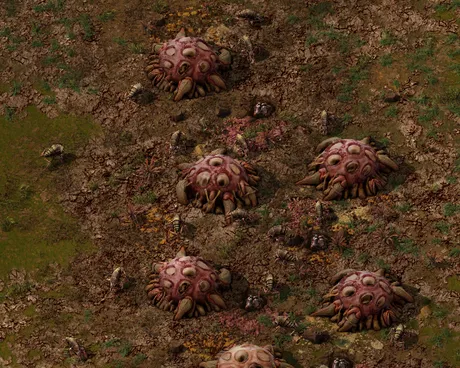
Another way the game stops us from winning very quickly is through research upgrades. It takes a lot of resources to upgrade new tech, which slows the game down and forces us to process millions upon millions of resources to get us to the end game.
Trees serve two purposes: you can chop them down and use them to build basic items like wooden chests and power poles, or you can use the lumber as fuel in buildings that require solid fuel and not electricity. The other function of trees is that they absorb some of the pollution we create, so if we position some buildings near a forest it's possible to mitigate the pollution and scale up without having to deal with attackers.
Belts
Belts are the lifeblood of every base. You can transport any object on a belt, and each belt has a left and right side that can move two different resources.
This is almost an automated solution, except for the picker that's unloading iron plates onto the belt. This picker requires coal to function, but does not have automated access to coal like all the other pickers that are facing the belt with all the coal on it. In order to fully automate this setup we'd need power to replace the basic picker with an electric one so it never stops working.
Centralization vs Decentralization
This entire game is one of logistics. We have to make all kinds of decisions that affect all the decisions that come later. Do we want to create a series of small bases that all create various goods, or should we create one huge base and ramp up scaling there to the maximum? There are hundreds of variables to consider while playing a game with so many options.
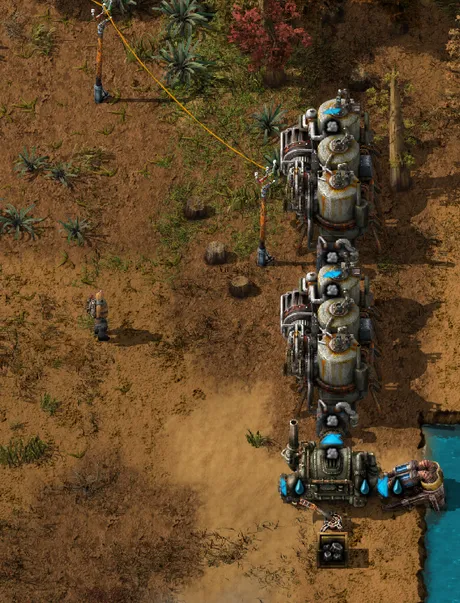
Here I have created electricity as described above. Water is boiled and the steam is used to power the turbines that create electricity by manipulating magnetic flux; a miracle technology created by Tesla. The real Tesla, not Elon Musk. Without this tech creating electricity would be no easy feat. We build on the backs of geniuses. Such is the hive of humanity.
Again, this is not an automated solution because the boiler doesn't have access to a belt in which coal is being mined onto. Rather, I've placed a chest here that again I will have to manually fill up every time it runs out. Luckily chests have a very large inventory and I can replace this temporary solution with something more permanent once I have the logistics and belts to accomplish full automation.
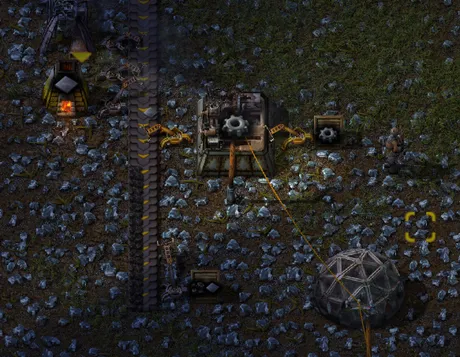
Now that my base has power I can research automation using a lab. An assembler can build most items in the game, and those items can be fully automated, with pickers grabbing raw materials off of belts and unloading the finished product into a chest or onto another belt to be used by yet other assemblers.
Here I'm pulling iron plates off the belt to create gears. However, this 'solution' creates more problems in terms of a bottleneck. If the gear assembler uses all my iron plates I won't be able to build anything else that requires iron plates. There are several ways to fix logistics problems like this (including splitters and even in-game programmable circuits) that are far beyond the scope of this post.
Exponential complexity.
I personally find this game and crypto in general to be relatively simple after spending so many years involved with it. It's only when I try to explain these concepts to newbies that I realize I could talk or write for hours on end and still barely scratch the surface of what's going on here. Much like humanity builds on the backs of our ancestors, so too do we build on top of our own cache of knowledge.
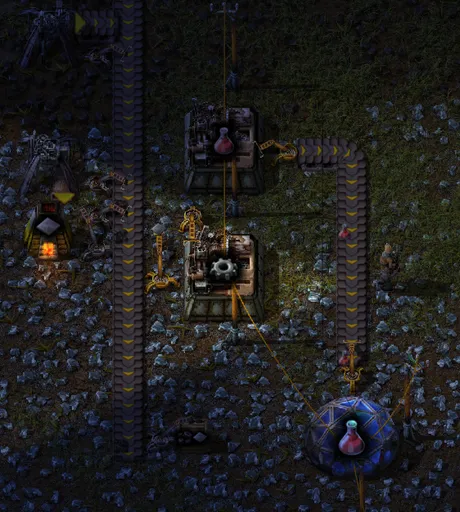
Here I've extended what I've done and created even more automation. Creating 1 red research pack requires 1 gear and 1 copper. The gears have been automated, but the copper hasn't been belted in yet because it is farther away. Factorio is full of these semi-automated solutions, but once we scale up and have dozens of these solutions in place it becomes too much to handle and a fully automated solution must be created to avoid bottlenecks and choke points.
What is the point of this exercise?
I believe this game has a huge future in front of it. I imagine what it will be like when connected to the cryptoverse. If it was possible for me to create scenarios/campaigns and get paid crypto for my troubles you can be damn sure I'd of made a mint already.
Factorio is a very important game because it is the ultimate honeypot for programmers and developers. If you like this game there's a very high chance you'd enjoy programming and learning about other complex systems of logistics, bandwidth, interactions, and scaling solutions.
In my opinion, the gamification of learning is an absolute necessity going forward. Learning needs to be fun, but not only that, learning needs to be a paying job. Crypto is the only way to manifest this ideology into an actual working business model. Such a concept is well beyond the scope of what the legacy economy could ever hope to accomplish. Crypto is primed to take over almost every aspect of the economy. Count on it.
Going forward
My focus on future development within the cryptosphere targets several key areas:
- Gaming
- Sustainable Energy
- 3D-Printing
- Automation
- Education
- High-paying freelance jobs
- Decentralized Reputation
- Farming, greenhouses, and clean water.
- Access to high-quality healthcare.
- Community
In order to solve these problems it's going to take millions upon millions of people working together in ways that were previously thought to be impossible on a large scale. Crypto is the technology that allows that to happen, but only by connecting crypto to everything else does it truly become useful. Interoperability is key.
Only by automating away the drudgery and valuing our citizens can we evolve to the next level of humanity. No longer can we use people as the automated cogs of the corporate machine. We must not only automate away all the jobs that no one wants to do, but we must also distribute those resources in a way that isn't going to destroy the economy. A widening gap between rich and poor will always lead to revolt and eventual societal collapse as history has shown countless times already.
Once this is accomplished, the things that people will be getting paid for will be truly mindblowing. Even as a gamer it makes very little sense to me how much one can make even on a centralized streaming service like Twitch. Even in Web 2.0, getting paid to play video games is a thing. Try to imagine what it's going to be like in Web 3.0 is a fool's errand. The future is not going to make a lot of sense for anyone who was born and raised in this cutthroat centralized world. Decentralization is coming.
Conclusion
Just like there are many ways to automate our Factorio base of operations, so to are there many ways of automating our crypto base of operations. Yield farms are just the beginning. Passive income is key. Active income is even better as it brings direct value to the network in the form of employees doing a job.
Real value comes from within, not from venture capital. The only way forward is to create jobs directly on-chain and pay the employees of the network directly in crypto, just like Hive does with the witnesses, stake holders, and blog posters.
However, these mythical jobs that will get created... they will require training and education. That has to be paid for as well, and I believe the best way to do it is with gamification combined with currency rewards. I'm constantly brainstorming about how this could be achieved, especially within the context of learning the Hive API and Javascript in order to get more builders onto this network.
In my view, a game like Factorio will be key to luring the right people to the network: the ones who have a knack for these kinds of things naturally. We can create systems that lead from one place to the next with smooth transitions, rewarding our users every step of the way; incentivizing them to delve deeper and deeper while learning more and generating value for everyone here.
It's time to automate this base.
Posted Using LeoFinance Beta
Return from Trapped in a game of Factorio to edicted's Web3 Blog
